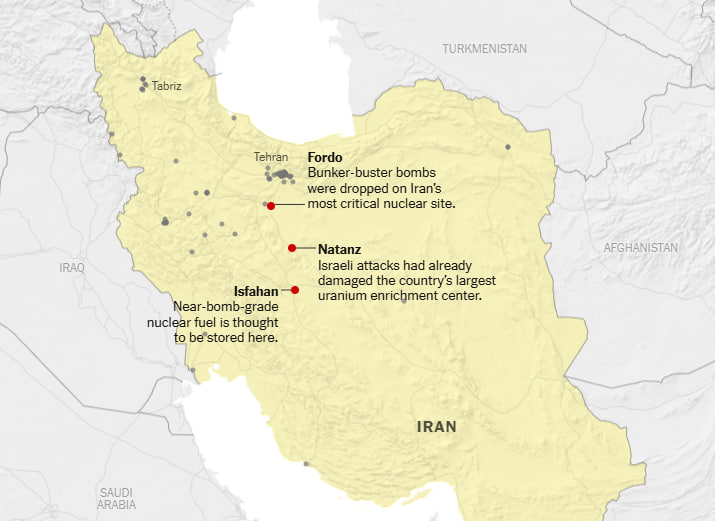😱 30 minutes ago in New York…See more

Trump Speaks After U.S. Bombs Key Iran Nuclear Sites
The U.S. has entered Israel’s war against Iran, attacking three nuclear sites. In an address from the White House, President Trump said the objective of the attacks “was the destruction of Iran’s nuclear enrichment capacity” and warned of more strikes “if peace does not come quickly.”
Pentagon officials said on Sunday that three of Iran’s nuclear sites sustained “severe damage” from the U.S. strikes overnight that have prompted a furious response from Tehran and set off fears of more dangerous escalations across the Middle East.
President Trump said the United States had joined Israel’s military campaign to destroy Iran’s nuclear enrichment capacity and claimed success, adding that three nuclear facilities had been “completely and totally obliterated.” But top Pentagon officials said that it was too soon to say whether Iran still retained some nuclear ability.
The United Nations Security Council will convene an emergency meeting on U.S. strikes on Iran at 3 p.m. Eastern time. Iran requested the meeting asking the Council to condemn the U.S. attack on its nuclear facilities and hold Washington accountable. The Council has already held two emergency meetings on the Israel conflict in the past week and members — with the exception of the United States — called for an immediate end to the fighting and for the resumption of diplomacy.
Republican lawmakers have largely lined up to support President Trump’s decision to strike Iran, but Representative Thomas Massie, Republican of Kentucky, was a notable exception on Sunday. Massie, who last week introduced a bipartisan resolution that would have required the Trump administration to seek congressional approval before attacking Iran, told CBS’s “Face the Nation” that “there were no imminent threat to the United States.” He added that Republicans who were “tired of endless wars in the Middle East” supported Trump’s bid for a second term because they were promised that his administration would “put our veterans, our immigration policies and our infrastructure first.”


After overnight strikes on Iran, President Trump on Sunday declared the operation a “success,” and said that Iran’s nuclear enrichment facilities were “completely and totally obliterated.” But his early public pronouncements contrast with more cautious assessments by the U.S. and Israeli militaries.
The Israeli military, in an initial analysis, believes the heavily fortified nuclear site at Fordo has sustained serious damage from the American strike on Sunday, but has not been completely destroyed, according to two Israeli officials with knowledge of the matter. The officials also said it appeared Iran had moved equipment, including uranium, from the site.
After news of the U.S. strikes on Iran, the New York Police Department announced it would enhance security at religious, cultural and diplomatic sites across New York City. The agency began to increase security at Jewish cultural and religious sites last week following Israel’s attacks on Iran.
On CBS’s “Face the Nation,” Secretary of State Marco Rubio emphasized the Trump administration’s message that the U.S. military’s strike on Iran was a surgical one, and that what comes next is up to Tehran. Rubio said “it doesn’t matter if the order was given” by Iran to develop a weapon, arguing that the enrichment levels that Iran had were far beyond anything for civilian use. Pressed on what the intelligence from the U.S. actually showed, Rubio called a description of the March intelligence assessment that Iran was not in process of building a bomb an “inaccurate” representation of the intelligence. While Mossad, Israel’s intelligence agency, believes that Iran can achieve a nuclear weapon in 15 days, American spy agencies believe that it could take several months, and up to a year, for Iran to make a weapon.

Senior Pentagon officials on Sunday described an extraordinary coordinated military operation targeting Iran that took place under utmost secrecy and showcased what the American military was capable of when it put in place its doctrine of using air and naval forces to strike an adversary.
But neither Defense Secretary Pete Hegseth nor Gen. Dan Caine, the chairman of the Joint Chiefs of Staff, could immediately say whether Iran still retained the ability to make a nuclear weapon. Mr. Hegseth repeated President Trump’s assertion from the previous night that the nuclear sites had been “obliterated.” General Caine did not.
Yemen’s Iran-backed Houthi militia, who had threatened to attack American ships in the Red Sea if the U.S. attacked Iran, appeared to be avoiding fiery statements that could further escalate the conflict. On social media, Houthi political official Mohammed al-Bukhaiti said that the group would “stand by any Arab or Islamic state that faces Israeli or American aggression,” but then added that they would not be “more kingly than the king,” — an Arabic expression akin to “holier than the pope.” He did not respond to a request for comment asking for clarification.
President Emmanuel Macron of France said in a post on social media that he spoke Sunday with Iran’s president, Masoud Pezeshkian, after the U.S. strikes. Macron said he urged Iran to “exercise the greatest restraint in this dangerous context,” to resume diplomatic discussions and renounce nuclear weapons. Macron said he also demanded the release of two French citizens being held by Iranian authorities on allegations of espionage, and will convene the Defense and Security Council Sunday evening to discuss the conflict.
About 30 Israeli Air Force jets struck dozens of targets across Iran on Sunday, including in the central Iranian regions of Isfahan and Yazd and the southern region of Bushehr, the Israeli military said in a statement. Among the targets were missile storage and launch sites, a drone storage site and a manufacturing site for air defense batteries, the statement said. The Mehr news agency, which is affiliated with the Iranian government, reported that Israeli aircraft targeted two scrap warehouses in a military zone in Yazd, causing no significant damage. According to the Fars news agency, an Iranian outlet affiliated with the Revolutionary Guards, two locations near the city of Bushehr were targeted in the Israeli attacks.
Iran’s Islamic Revolutionary Guards Corps threatened to retaliate in the wake of the U.S. attack on Iranian nuclear sites. In a statement carried by the Iranian state news agency IRNA, the military body said the vast number of U.S. bases in the region were not a point of strength, but rather a vulnerability. The Guards Corps added that Iran retained the right to respond in self-defense and said the U.S. would “await regrettable consequences.”
Pope Leo XIV posted an anti-war message online following the U.S. strikes on three of Iran’s nuclear sites. “War does not solve problems; on the contrary, it amplifies them and inflicts deep wounds on the history of peoples, which take generations to heal,” he wrote. “No armed victory can compensate for the pain of mothers, the fear of children, or stolen futures. May diplomacy silence the weapons! May nations chart their futures with works of peace, not with violence and bloodstained conflicts!”



